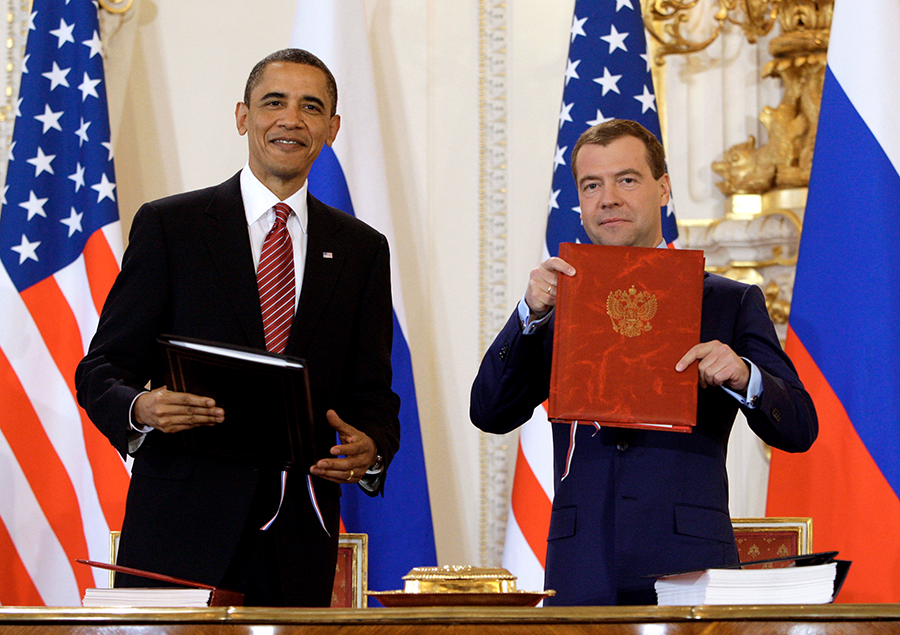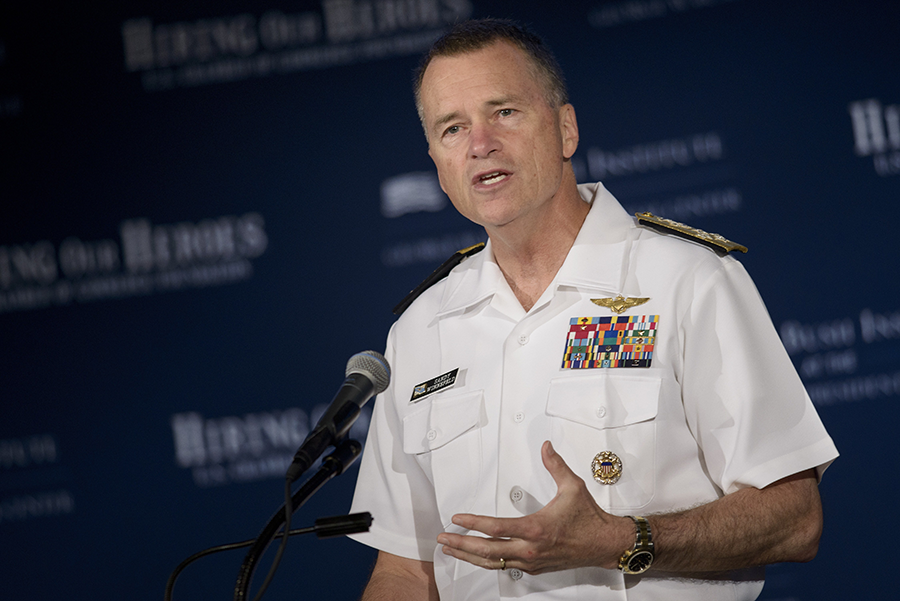A U.S. Perspective: An Interview With Admiral James Winnefeld (USN, ret.)
January/February 2020
What If New START Expires? Three National Perspectives
 With the collapse of the Intermediate-Range Nuclear Forces (INF) Treaty on August 2, the New Strategic Arms Reduction Treaty (New START) is now the only remaining arms control agreement limiting at least a portion of the U.S. and Russian nuclear arsenals. New START expires on February 5, 2021, but can be extended by up to five years by agreement of the U.S. and Russian presidents. If the treaty expires without an extension or replacement, there will be no legally binding constraints on the world's two largest nuclear arsenals for the first time in half a century. Although Russia has indicated its support for a clean, unconditional extension, the Trump administration remains officially undecided about whether to extend the treaty and is seeking a more comprehensive arms control agreement that includes more types of Russian weapons as well as China. Arms Control Today sought the views of experts in China, Russia, and the United States to describe today’s situation and look to the future.
With the collapse of the Intermediate-Range Nuclear Forces (INF) Treaty on August 2, the New Strategic Arms Reduction Treaty (New START) is now the only remaining arms control agreement limiting at least a portion of the U.S. and Russian nuclear arsenals. New START expires on February 5, 2021, but can be extended by up to five years by agreement of the U.S. and Russian presidents. If the treaty expires without an extension or replacement, there will be no legally binding constraints on the world's two largest nuclear arsenals for the first time in half a century. Although Russia has indicated its support for a clean, unconditional extension, the Trump administration remains officially undecided about whether to extend the treaty and is seeking a more comprehensive arms control agreement that includes more types of Russian weapons as well as China. Arms Control Today sought the views of experts in China, Russia, and the United States to describe today’s situation and look to the future.
A U.S. Perspective: An Interview With Admiral James Winnefeld (USN, ret.)
Arms Control Today: The five most recent U.S. presidents negotiated agreements with Russia to control and reduce both nuclear arsenals, and only President George W. Bush negotiated an agreement that did not contain detailed verification provisions. Do you think arms control still serves an important role in curtailing threats to the United States and its allies?
Admiral James Winnefeld: Properly constructed arms control agreements serve several important purposes. The principal reason for limiting the number and type of nuclear arms and delivery vehicles in a mutually balanced and adequately transparent manner is to maintain strategic stability, which lowers the likelihood that one nation believes it could win a nuclear war. Second, all other safeguards considered, fewer nuclear weapons reduces the likelihood of accidents or proliferation. Finally, fewer strategic systems allows smaller national expenditures to defend the nation’s most vital interest, which frees those resources for other purposes.
ACT: Do you support extending New START for five years, as allowed by the treaty?
 Winnefeld: Extending New START will bolster U.S. security while future arms control arrangements are negotiated. New START is not perfect. No treaty ever is or will be, but this treaty has served the principal purpose of arms control: maintaining strategic stability. I applaud the administration’s desire for a new treaty that would account for recent Russian activity, but it would be difficult to negotiate such a treaty today given the prevailing geopolitical environment and the U.S. and Russian domestic political environments. Extending the treaty could provide a window of opportunity in which those environments could evolve and set the conditions for a successful negotiation. It would be better for both sides to negotiate such a treaty from an existing baseline rather than in a vacuum, and we have little to lose by extending it.
Winnefeld: Extending New START will bolster U.S. security while future arms control arrangements are negotiated. New START is not perfect. No treaty ever is or will be, but this treaty has served the principal purpose of arms control: maintaining strategic stability. I applaud the administration’s desire for a new treaty that would account for recent Russian activity, but it would be difficult to negotiate such a treaty today given the prevailing geopolitical environment and the U.S. and Russian domestic political environments. Extending the treaty could provide a window of opportunity in which those environments could evolve and set the conditions for a successful negotiation. It would be better for both sides to negotiate such a treaty from an existing baseline rather than in a vacuum, and we have little to lose by extending it.
To be sure, crafting a new treaty will be difficult. The U.S. team will need to negotiate from a position of strength and avoid a tendency to reveal its bottom line early or negotiate with itself. After all, a bad treaty is worse than no treaty at all. Both sides will have to account for changes that have occurred since New START was ratified, including advances made by Russia in systems not covered by the existing treaty, such as hypersonic weapons and new types of undersea weapons. The United States will need to continue developing ballistic missile defenses to counter North Korean and Iranian threats, but this remains a major irritant for Russia and is what probably stimulated their development of unorthodox systems. Russia will resist the solid verification measures needed to preclude their tendency to cheat, but just because talks will be difficult does not mean we should not try, as long as the U.S. side can maintain the discipline to negotiate a treaty that serves our nation’s interests well.
ACT: Why has the U.S. military been a strong proponent of strategic arms control, including New START? What is it about strategic offensive armaments that have led the United States and Russia, through the ups and downs in the political relationship, to continue to pursue limits on these weapons? If we have less visibility into Russia's nuclear capabilities, their force structure, and their modernization plans, which would be the case without New START, what impact could that have on U.S. military planning and spending?
Winnefeld: The U.S. military fully recognizes the benefits of well-constructed arms control treaties, for all the reasons outlined above. Moreover, the predictability provided by these treaties permits more stable defense planning, especially in an era in which defense budgets are highly unstable. Although a future treaty negotiation will be shaped by the nation’s strategic force modernization plans, the reverse is also true. For example, New START limited the number of sea-based ballistic missile launch tubes, which required the United States to decommission some existing launchers in its submarines. This limit clearly guided plans for the next generation of U.S. submarines. An absence of boundaries and transparency over Russia’s program development could lead to program disruption when a response is required by an unanticipated change in the trajectory of Russian strategic systems development.
ACT: Is there any way to replace the information gained through the “boots on the ground” inspections provided by New START if the treaty disappears? If we lose the New START verification regime, would the Pentagon and the intelligence community have to spend more on national technical means of verification to make up for this loss?
Winnefeld: Sadly, unlike the U.S. security culture of strict compliance with treaties, Russian security culture permits and perhaps encourages getting away with anything they can. It is why the Russian side always resists verification measures, which underscores the importance of verification. High-confidence arms control verification requires a multifaceted approach in which actual visits on the ground augment other measures, technical and nontechnical. These other means are no doubt how the United States discovered Russia’s plain violation of the Intermediate-Range Nuclear Forces Treaty, which eventually caused the United States to withdraw from the treaty after two successive administrations tried to bring Russia back into compliance. Loss of an on-the-ground verification regime might not cause the Pentagon and intelligence community to spend additional money on other means of verification, but it would stress existing means and lower U.S. confidence in Russian compliance.
ACT: With respect to the administration's desire to bring China into the arms control process, China has stated repeatedly that it is not interested in entering negotiations on a multilateral agreement, citing the large disparity between the size of the Chinese arsenal and the arsenals of the United States and Russia. Do you think it is possible to negotiate an agreement to limit China's nuclear forces before New START expires in February 2021? Would extending New START buy time to engage Russia and China on a more comprehensive arms control approach? Short of limiting China's nuclear forces, what are some practical steps the United States could pursue to bring China into the arms control process?
Winnefeld: It is relatively easy to predict the motions of two celestial bodies as governed by gravitational forces. Predicting the motion of three bodies, however, involves heretofore unsolvable differential equations, the so-called three-body problem. Similarly, bringing a third party into an arms control negotiation dramatically raises the already high level of complexity of reaching a bilateral agreement, especially if one party is reluctant to participate. Meanwhile, it is difficult to imagine circumstances that would make it possible to negotiate a bilateral agreement with China before 2021, especially given other ongoing tensions, such as trade disputes. That said, every effort should be made to explore how a negotiation, whether bilateral or trilateral, might work and to encourage it. This would be probably best initiated by Track 2 discussions to lower the political risk of setting prematurely high expectations.
